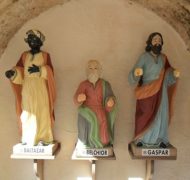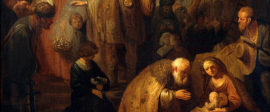Christmas Scriptures: Home By Another Way: Matthew 2 and 7 Sermon Notes
Sermon Notes / Produced by The High Calling
Overview:
Sermon explores possible implications of Christmas for work. Does the Incarnation influence, shape our understanding of the purpose or manner of our work? With a Kingdom of God, Incarnational understanding of Christmas, we might approach our work in new and different ways.
As “seekers,” we approach our work looking for evidences, expressions of God in and through our work.
As “santons,” we affirm the product of our work as a gift to offer Christ. Having been to the manger and experienced Christmas may require us to return to our work with different perspective, purpose, or set of standards. Can we approach our work as God’s continuing creative, redeeming, renewing work? Understanding our work as worship, can we live that out in active ways that are transformative, beyond conventional wisdom, more robustly match Biblical faithfulness?
The Goal: To challenge followers of Christ to approach work differently, beyond self-interest and conventional wisdom, a servant of Christ in a new and different way.
Text: Matthew 2:12. (With expansion from Matthew 7, esp. v. 12-14, Romans 12:1-2, 9f)
Introduction: Matthew concludes the passage about the wise men by reporting an act of civil disobedience: “They returned to their country by another road, since God had warned them in a dream not to go back to Herod.” After encountering the true King for the magi—(2 Cor. 5), “all things become new.’” Like the line from WWI, they had been to Paris, and everything looked different from that time on.
Reference James Taylor’s song “Home by Another Way,” whole song or selected lines: “They warned in a dream of king Herod’s scheme/ They went home by another way,/ Yes, they went home by another way,/ Maybe me and you can be wise guys too, and go home by/ Another way/ We can make it another way/ Safe home as they use to say/ Keep a weather eye to the chart/ on high/ And go home another way”
Maybe we can be wise guys too! about, at, through our work. As a result of a genuine encounter with Christ in a manger, everything has different perspective, tone, shape, purpose.
In the words of Matthew 7, we can look at the wisdom of the Wide Gate vs. the wisdom of the Narrow Gate; Herod’s, the World’s Way vs. God’s Way; the Easy Way vs. the Hard Way; the Ordinary, Common, Conventional Wisdom vs. the Exceptional Biblical Wisdom.
A. The Wide Gate. See Matthew 7:15-23
Taylor describes it as: “Royal welcomes,” “Big to-do,” flattery, gifts, status or power symbols, work done to impress others, receive acclamation. There is a place for respecting, honoring the expectations of persons/ organizations for whom we work, but to “serve” their needs, not self-glory.
Herod is a symbol for all the cunning, scheming, deception associated with Evil. Satan comes disguised, a wolf in sheep’s clothing, “kingly” symbols and dishonest promises.
Tim Keller (Every Good Endeavor, chapter 8) lists Idols of “Herod’s Way,” including: comfort, power, control, social stability, individual rights, freedom, and achievement; worth, self identity achieved through our performance. The end result “work becomes fruitless,” “pointless,” “selfish,” as we work through “thorns and thistles” (Genesis 3).
After Christmas, it is easy to travel back to Herod, “business as usual,” approach work as “necessary evil,” a result of expulsion from the Garden (a gross misunderstanding of work within the Garden). In response, we often affirm “work ethic,” or financial gain that enables contribution to Christian work, even “self-justification” through my good, hard, well-rewarded labor.
For many, it is back to work through the wide gate.
B. Another Way: Narrow Gate, Unconventional Wisdom, Biblical Wisdom, God’s Way
In Matthew 5-7, Jesus lists the qualities, attitudes, and behaviors of the Narrow Way, “home by another way.” The Beatitudes identify specific qualities and behaviors connected to being “blessed” or “happy” (See also Pope Francis’ “10 Tips for a Happier Life” from Catholic News Service, July 31, 2014). In Matthew 7, before he tells us: “do not judge,” v.1; “take the log out of your own eye,” v.5; “do not give what is holy to dogs,” v.6; “ask, search, knock,” v.7; “do to others as you would have them do for you,” v.12; “enter the narrow gate,” v.13; “beware of false prophets,” v.15; “only the one who does the will of my father,” v.21—“will enter the kingdom.” “Everyone who hears these words of mine and acts on them will be like a wise man . . .,” v.24. The narrow gate is for the wise and faithful: Unconventional wisdom, Biblical wisdom, God’s way. It is the “way home by another way”: The Way.
Jeff Van Duzer’s Why Business Matters to God (IVP) states that business is called first, not to profit, but to fulfill God’s purposes of providing goods and services that serve the “common good.” Conventional business wisdom expects maximizing profits for the benefit of the shareholder. An alternative to this is advancing God’s kingdom by creating meaningful work that enables workers to express their God-given identity and talents and offering goods and services that enable communities to flourish. Profits are a means to better serve the community. This includes sustainability, living wages, and ways to restore, repair, reconcile the broken pieces.
At the Aspen Ideas Festival, New York Times columnist David Brooks contrasted Adam I (“happiness and resume” culture); with Adam 2 (“inner depth”). A person of inner depth has “a profound spiritual presence. . . a web of unconditional love, permanent philosophy, commitments to projects that can’t be completed in a lifetime, and a certain consistency and rigor that’s almost perfect.”
Brooks lists five qualities to help us be deep: Love, Suffering, Internal Struggle, Obedience, and Acceptance. Tim Keller in Every Good Endeavor (p.150) says that we can find hope, another way of working, through alternative world view, partnership with God, a new moral compass, and changed motivation. We are created in the image of God who is a worker, creator, reconciler, redeemer; who establishes order; and who partners with creatures to accomplish God’s purpose. We are to recognize our limits, bring order out of chaos, and build a civilization. Work is “service,” avodah, which is love in action. We are to work for the common good, with competence and excellence. This is work under the power of the Holy Spirit, with passion that also requires Sabbath.
There may be additional expressions of “uncommon wisdom” that could be added here, each consistent with Biblical wisdom: diligence, discipline, excellence, etc.
Romans 12:2, translated by J. B. Phillips, is helpful, “don’t let the world around you squeeze you into its own mould, but let God re-mould your minds from within, so that you may prove in practice that the plan of God for you is good, meets all his demands, and moves towards the goal of true maturity.” As translated by Eugene Peterson, “Don’t become so well-adjusted to your culture that you fit into it without even thinking. Instead, fix your attention on God. You will be changed from the inside out.”
C. Application: How Do We Go Back to Work by Another Way?
How does my work facilitate God’s purposes? We can go through each of the lists above and ask how this would look tomorrow, this week, this year at work, or through my work?
Jesus in Matthew 5-7
Tim Keller’s Theological Reflections/Observations
Pope Francis’ 10 Tips for Happiness
Jesus in Matthew 5-7
David Brooks’ list of ways to nourish Adam 2
Perhaps the preacher could take 3 or 4 items from these lists and ask open-ended questions as to how this might be expressed in and through work.
Note: Caution: This is not “Triumphalism.” Rather it is transformational, an invitation into the “Messy Middle,” with conflicting perspectives and no simple answers. It is an invitation into greater complexity that can be creative as well as painful, a healthy tension, with a simplicity of focus, purpose.
We are not to approach our work in isolation. We have the presence of the Holy Spirit. And we need the friendship of others. The way of the cross is painful, but it is also life-giving.
Open-ended questions might include:
In what ways does my work help to subdue, manage, steward, give order to what God intended in creation, facilitate the development of a “land flowing with milk and honey”?
In what ways does my work (In what ways do I in my work) help to rescue, redeem, reconcile what is broken? What do I need to avoid that contributes to brokenness? In what ways could my work contribute to the renewing, restoration work of God and “New Creation”?
How does my work/way of working express the depth and dynamic of God’s love for me and through me for others?
How does the product of my work, the ultimate outcome of my organization/institution contribute to the Common Good?
Encourage each person to think very specifically about their actions, decisions, etc. (perhaps inviting each to write down a specific action on their bulletin).
Conclusion:
James Taylor’s song reminds us to “Keep a Weather Eye to the Chart on High.” We do need to be alert, thoughtful, with calm confidence that God is at work in us. We continue to be those who seek, ask, knock (return to visual of magi—traveling) for new perspectives. Having found Jesus the King, the treasure, we go back home, into the world seeking new ways to apply what we have found and use it to bless. While challenging, filled with complexity, it is “the way of the cross.” It is also “the way of the empty tomb,” resurrection.
T. S. Elliot: “So we continued/ And arrived at evening, not a moment too soon/ Finding the place; it was (you may say) satisfactory.
“All this was a long time ago, I remember,/ And I would do it again, but set down/ this set down/This: were we led all that way for/ Birth of Death? There was a Birth, certainly/ We had evidence no doubt. I had seen birth and death,/ But had thought they were different; this Birth was/ Hard and bitter agony for us, like Death, our death./ We returned to our places, these kingdoms,/ But no longer at ease here, in the old dispensation,/ With an alien people clutching their gods./ I should be glad of another death.”
James Taylor: “It’s best to go home by another way/ We got this far to a lucky star/ We can make it another way/ Safe home as they used to say/ Keep a weather eye to the chart on high/ And go home another way.”
William Diehl: “Thank God, It’s Monday” (title of book, written by William Diehl published by Fortress, Philadelphia, 1982).
John Coltrane: “I experienced, by the grace of God, a spiritual awakening which was to lead me to a fuller, more productive life. At that time, in gratitude, I humbly asked to be given the means and privilege to make others happy through music. I feel this has been granted through His grace. All Praise to God . . . . This album is a humble offering to Him. An attempt to say ‘THANK YOU GOD’ through our work, even as we do in our hearts and with our tongues. May He help and strengthen all men in every good endeavor” as quoted in Every Good Endeavor by Tim Keller and Katherine Alsdorf (Dutton, 2012).
*****************************************************************************************************
Dave Williamson is former director of Laity Lodge and on the steering committee of the Theology of Work Project.



.jpg)







